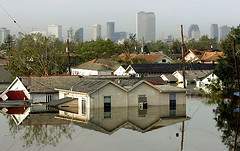The National Trust Announces Relief Efforts for Gulf Coast Region Affected by Hurricane Katrina
 New Orleans.
New Orleans.Washington, D.C. (August 31, 2005) – Today, the National Trust for Historic Preservation announced that it will make grant funds and technical assistance available to organizations in areas affected by Hurricane Katrina to help defray costs associated with repairing damage to historic areas.
“In the wake of Hurricane Katrina, our immediate thoughts and efforts must be directed toward those whose lives are still at risk. But it is not too early to begin planning the massive effort that will be required to restore the hard-hit communities of the Gulf Coast. This effort will necessarily involve billions of private and public dollars, both from the United States and abroad,” said Richard Moe, president of the National Trust for Historic Preservation.
“It is already apparent that New Orleans has suffered the most devastating natural disaster to befall a historic American city since Galveston was leveled by a hurricane in 1900 and San Francisco was ravaged by earthquake and fire in 1906. Because New Orleans is a unique city, with a rich mix of history, traditions and architecture found nowhere else, because it is a cultural treasure of international significance, the stabilization and restoration of its world-famed historic landmarks and neighborhoods should be a matter of global concern.”
“Americans have been hugely generous over the years in helping to save such endangered places as Venice, and now we will need to ask our friends around the world to help New Orleans and the other cities and communities affected. The National Trust will be in the forefront of this effort to reach out to friends and partners both here and abroad,” Moe said.
The Gulf Region - uniquely rooted in its heritage – is home to a wealth of historic resources and neighborhoods, including well-known sites such as the New Orleans French Quarter. At the appropriate time, the National Trust will provide assistance by offering assessment teams with expertise in repairing damage to historic structures and community revitalization. The assessment phase of damage to the historic buildings will only occur after the important work of immediate relief is completed and the region is open again to damage assessments and planning for the future rebuilding. Historic Hotels of America (HHA), a program of the National Trust, has several hotels affected by Hurricane Katrina. HHA will coordinate a national effort with the more than 200 hotels in the organization to provide aid to the families of employees at these hotels.
The National Trust web site is offering the public an opportunity to donate to grant funds for preservation work specifically directed toward the disaster along the Gulf Coast, and is allowing those with the appropriate credentials to sign up for the National Trust and FEMA Heritage Assessment teams.
For more information, please contact the Office of Communications, 202-588-6141 or pr@nthp.org.
____________
The National Trust for Historic Preservation is a private, nonprofit membership organization dedicated to saving historic places and revitalizing America's communities. Recipient of the National Humanities Medal, the Trust was founded in 1949 and provides leadership, education, advocacy, and resources to protect the irreplaceable places that tell America’s story. Staff at the Washington, D.C. headquarters, six regional offices and 26 historic sites work with the Trust’s 270,000 members and thousands of preservation groups in all 50 states. For more information, visit the Trust’s web site.



0 Comments:
Post a Comment
<< Home